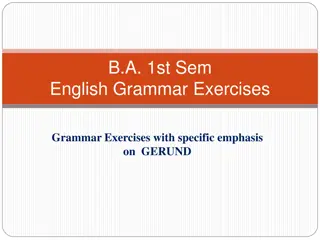Understanding Infinitives and Gerunds in English Grammar
Learn the distinctions between infinitives and gerunds in English grammar. Discover when to use gerunds as subjects, after prepositions, and following verbs of emotions. Identify verbs that require a gerund or an infinitive as their complement based on different contexts. Explore how infinitives are used after adjectives and specific verbs that are followed by nouns or pronouns. Enhance your understanding of English language structures with practical examples.
Download Presentation

Please find below an Image/Link to download the presentation.
The content on the website is provided AS IS for your information and personal use only. It may not be sold, licensed, or shared on other websites without obtaining consent from the author. Download presentation by click this link. If you encounter any issues during the download, it is possible that the publisher has removed the file from their server.
E N D
Presentation Transcript
Infinitives/Gerunds When the verb is a subject: Gerund Going on a diet is the best thing I ever did After a preposition He is tired of listening to you After verbs of emotions (love, adore, like, dislike, don t like, hate, despise) I love playing tennis I hate watching reality shows
Verbs that need to be followed by a GERUND: admit: They admitted changing the schedule. advise: I advise proceeding (moving forward) with caution. avoid: She avoided looking me in the eye. consider (think about): I considered staying silent, but I had to tell her. deny: I denied knowing about his secret. involve: The course involved writing three tests. mention (say something): She mentioned seeing my brother at a baseball game. recommend: I recommend practicing gerunds and infinitives. risk: Don t risk losing your job suggest: I suggest reading more English short stories.
Verbs that need to be followed by an infinitive: agree: I agreed to go to a party with my friend. decide: The president decided not to participate in the discussions. deserve: Everyone deserves to be respected. expect: I expect to know my exam grade by tomorrow. hope: We were hoping to avoid traffic by leaving early. learn: He learned not to trust anyone. need: She needs to learn how to cook. offer: I offered to help my brother with homework. plan: We are planning to watch a movie tonight. promise: My friend promised to find the time to help me move. seem: We seem to be lost. wait: I cannot wait to see my family. want: I don t want to go to bed yet.
Infinitives are used after many adjectives. It is not easy to graduate from university. It is necessary to speak English to work in a hotel. It is wonderful to have close friends.
Only infinitives are used after certain verbs followed by nouns or pronouns referring to a person. ask: Can I ask you to help me with something? expect: I never expected him to become famous. hire (give a job to someone): Did the company hire you just to sit in your office? invite: I invited a friend to attend the ceremony. order: She ordered the child to stay at home. remind: Please remind me to wash the dishes. require: The test required him to concentrate fully. teach: That will teach you to follow the rules! tell: Who told you to come here? urge: They urged me to continue my research. warn: I am warning you not to do this!


























